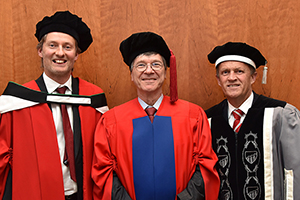Latest News Archive
Please select Category, Year, and then Month to display items
27 December 2021
|
Story Jóhann Thormählen
|
Photo Supplied
 The Kovsie Annerie Dercksen is one of South Africa’s most promising youngsters and climbing the cricketing ladder.
The Kovsie Annerie Dercksen is one of South Africa’s most promising youngsters and climbing the cricketing ladder.
She enjoyed every second of playing with some of her heroes and believes the exposure to international cricket will help her become a better player.
Annerie Dercksen is one of South Africa’s most promising youngsters and climbing the cricketing ladder.
Star from Beaufort West
This second-year Education student from the University of the Free State (UFS), who dreams of playing for the Momentum Proteas, represented the South African Emerging Women’s team three times in 2021.
The star from Beaufort West toured with the side to Bangladesh and also played against Zimbabwe and Thailand in One Day and T20 matches.
According to Dercksen, it is an incredible honour and privilege to be a part of a side.
She soaked up the experience and says everyone was willing to share their knowledge.
“I would have to say, sharing the field with some of my heroes and getting to work with some of the best coaches in the country are some of the highlights.”
She says each tour brought its own challenges and this helped her grow in the way she views and approaches the game.
“In Bangladesh we played against a well-established team in foreign conditions while facing a lot of spinners in spin friendly conditions. Personally, it was quite a challenge and I had to come back and work on some options, especially against spin.”
“Each tour brought its own challenges and this helped me grow in the way I view and approach the game.” - Annerie Dercksen
Coming through the ranks
The all-rounder has come through the ranks. She represented South-Western Districts at school level, played for the South African U19 side and is currently representing the Free State.
But Dercksen didn’t always dream cricket, especially not when playing ‘backyard’ cricket with her brother on the farm.
She didn’t even play for a team at school. “Until a boy from our primary school’s team got sick before a game. A teacher came to class and asked, ‘who can play cricket’, and I put up my hand.”
Prof Jeffrey Sachs presented with honorary doctorate at Spring Graduation Ceremony
2015-10-01

Prof Jeffrey Sachs (centre) with Prof Philippe Burger,
Head of Department: Economics (left), and
Prof HJ Kroukamp, Dean of the Faculty of Economic and
Management Sciences (right).
Photo: Charl Devenish |
“Quality education is the best accelerator for sustainable growth. Universities have a unique role to play in this regard,” Prof Jeffrey Sachs said during a lecture he presented at the University of the Free State (UFS) Faculty of Economic and Management Sciences. He gave an insightful overview of the new Sustainable Development Goals (SDGs) of the United Nations. The 17 SDGs replace the Millennium Development goals of the past 15 years. In a major achievement, 193 countries will sign the goals at the United Nations (UN) in New York on 25 September 2015.
Prof Sachs is the director of The Earth Institute, Quetelet professor of Sustainable Development, and professor of Health Policy and Management at Columbia University. He is also a special advisor to the UN Secretary-General Ban Ki-moon on the Millennium Development Goals, and director of the UN Sustainable Development Solutions Network. Another accolade now added to his résumé is an honorary doctorate in Economics conferred on him by the UFS at the Spring Graduation Ceremony on 17 September 2015 for outstanding achievements and contribution to academia.
“South Africa is not achieving sustainable development. It has the highest inequality in the world with high unemployment among the youth. Quality education is the best accelerator for growth,” Prof Sachs said. He used the high education investment in Korea as an example of that country’s growth. Prof Sachs added that the government cannot achieve the SDGs on its own. “It is important for the country and universities to take on the goals. Universities can apply pressure, influence and provide solutions.”